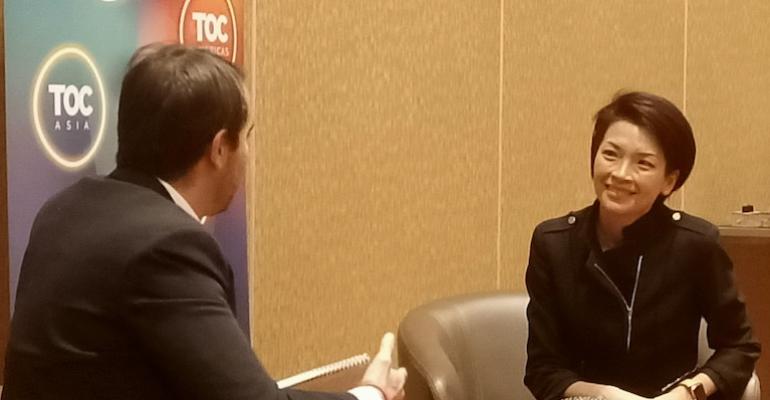Set up 16 months ago GCMD currently has three projects ongoing focusing on guidelines for ammonia bunkering, an assurance scheme for biofuels, and carbon capture and storage (CCS).
“Increasingly we’re realising it’s really important to think about the landside as well, without landside infrastructure you can’t decarbonise shipping,” Prof Loo, told the conference audience.
It’s estimated that decarbonising shipping will cost $3trn, of which some 80% will be related to production, supply and landside infrastructure for green fuels.
One of the starting points for decarbonising are green corridors linking key ports on major trades the longest of which under development is a green and digital corridor between Singapore and Rotterdam.
“There are no green corridors without green infrastructure,” she said. “The green corridors need to be anchored by ports and infrastructure, so it’s really important for us to start thinking about the landside of shipping.”
Moderator Paul Gallie, Director of Business Development for AP Moller Capital, noted that in the past ports only required facilities to bunker heavy fuel oil (HFO), however, in future they would need infrastructure for multiple fuel types such as ammonia and methanol. This will require different tanking arrangements and as green fuels are significantly less energy dense than fossil fuels more storage will be required.
Prof Loo highlighted the Clean Energy Marine Hubs initiative from the International Chamber of Shipping (ICS) and the International Associations of Ports and Harbours (IAPH). Five countries have currently signed up to the initiative - Panama, Norway, Canada, the United Arab Emirates and Uruguay.
She said that by setting up these Clean Energy Marine Hubs it gets governments talking to industry to accelerate the production of green fuels. “Green hydrogen has a myriad of other applications too so you can use these hubs basically to anchor industries to anchor the shipping sector.
Copyright © 2024. All rights reserved. Seatrade, a trading name of Informa Markets (UK) Limited.
Add Seatrade Maritime News to your Google News feed.  |

